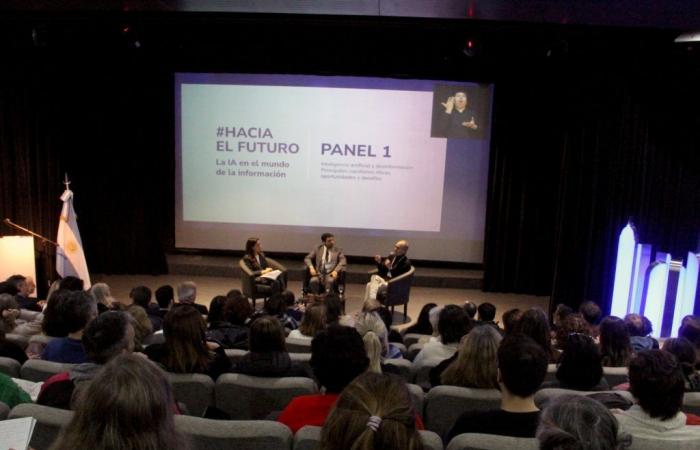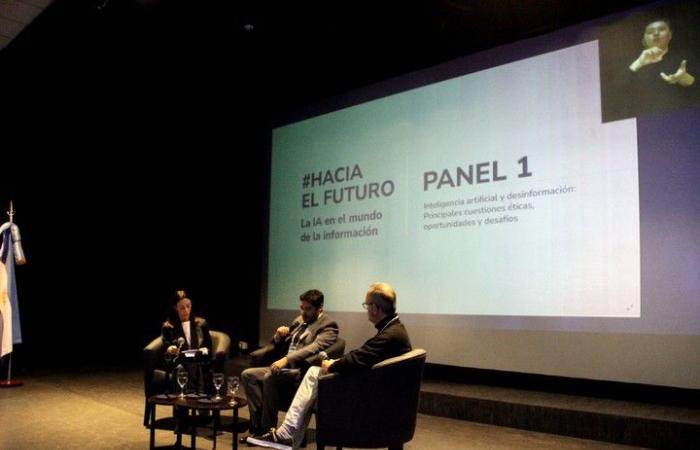The technological advances in Artificial Intelligence (AI) continues to expand at a dizzying pace. But beware: its use can either benefit or cause risks to society. What about the application of AI to access public information? What are its risks and benefits? These questions were one of the axes of debate in “#Towards the future. AI in the world of information”, the first discussion about new technologies and perspectives on public information that took place this week before a large audience in the Leonardo Favio Auditorium, in the Library of the National Congress, jointly with the United Nations Argentina. It was also transmitted via streaming by YouTube.
“Today we have a new challenge: AI. We deeply believe that he comes to help to those of us who have the responsibility of verifying information in society,” he said. Alejandro Santa, General Coordinating Director of the Library of the National Congressat the opening.
“Artificial Intelligence and disinformation. Main ethical issues, opportunities and challenges” opened the debate with a panel made up of Matias Ponce (representative of the regional office of the UNESCO Montevideo) and Eduardo Ceccotti (Communication Director of Checked).
Access to public information
The positive thing is that Artificial Intelligence has the potential to revolutionize people’s lives: “From improving the efficiency of various sectors to offer innovative solutions to complex problems,” he said. Tamar Hahndirector ofThe United Nations Information Centre for Argentina and Uruguay, in its role as moderator.
“What are the most promising opportunities that AI offers to enhance public information? “How can we maximize its positive impact and what would be its main risks,” he asked.
“For those of us who work on public information issues, the opportunity that AI offers us comes from various angles. The first is the opportunity to improvement in access to public information“, Matías Ponce stressed.
According to the UNESCO member, the active online transparency processes; the introduction of chatbots or virtual assistants are part of the benefits that AI generates so that users can access information more quickly, counting on the assistance of AI as a solution to potential inconveniences, such as searching for public information on the web.
The Personalization of information in public management This is another of the positive biases that the use of AI provides, not only for access to information in terms of active online transparency, but also in the generation of content in the design of public policies, which are more personalized for users of public services.
“There we have another opportunity when algorithms can store information and get to know the public service user better. Therefore, AI technology can provide more personalized experiences to those approaching the State and to public policies,” Ponce added.
UNESCO has prepared communication and information notebooks in Latin America and the Caribbean regarding the introduction of AI in newsrooms. “We reviewed all the opportunities that can occur in a newsroom, especially the new work horizons for those who summarize the social reality of journalism,” Ponce highlighted.
To do this, education and training are needed to be able to to provide society with greater tools to maximize their use“We call it Media Information Literacy (MIL), a tool or space for action to enhance the capacities that citizens have to make critical use of these tools. This first approach is a strong emphasis on education,” Ponce said.
Can the use of AI be regulated?
“Yes, it can be regulated. Progress can be made on national public policy plans on AIcreate regulatory frameworks but they must have a multi-actor approach: that is, the same approach that we at UNESCO have proposed for media regulation in the areas of communication policies.”
“This is: All actors must be seated at the table. The construction of the AI ethical recommendation approved by the 193 member states is a clear approach to sharing, cross-cutting agreement over the horizon to work on this issue,” Ponce concluded.
What are the main risks?
There are great challenges in privacy and data security matters“There is no regulatory framework that can stop it because technology is always ahead of any effort,” Ponce explained.
If it is about malice, Artificial Intelligence, especially generative AI, can produce and deepen such serious aspects such as online hate speech based on the construction of biases.
“Another horizon may perhaps be worse: the use of AI with biases, especially within the framework of availability policies: if there is no clear regulatory framework It could be an alarm“, he said.
Besides, the AI content moderation on social media could end in processes of restricting the freedom of expression“warned the UNESCO member.
Third is technological dependence. “If we do not have equitable access to AI tools, Access gaps will be reproduced that already exist,” Ponce said.
There are also the disinformation processes as a risk factor. Especially in the use of video, image or voice files manipulated through AI software to make them appear original, authentic or real. This is called deepfake.
In addition to the use of public debate that can take place on the networks, “what happens when a deepfake interferes in a judicial process and it is presented as evidence in the middle of this process?” questioned Ponce.
Between misinformation and hate speech
From Chequeado, the NGO specialized in verifying public speeches and in the fight against disinformation through its website, they warn that Malicious use of AI could lead to negative consequences for democratic systems and in society.
“When we talk about disinformation we say that it is a risk to the health of democracy. Misinformation affects a basic right: the right to information, so that we, as citizens, receive clear, transparent and verified information in order to make our decisions,” said Eduardo Ceccotti, Communications Director of Chequeado.com.
He also said that Technology accelerated and facilitated the circulation of disinformation: “AI to date is the icing on the cake but the menu will follow. “AI, in the context of technology accelerating misinformation, presents a problem for the health of democracies, for citizens.”
How to mitigate the impact?
Checcotti pointed out that Chequeado and other international organizations have long been using Artificial Intelligence as tool in the fight against disinformation.
“Since 2016 we have been experimenting with AI to generate our own development. For example, we have developed an AI powerhouse called CheqeaBot: allows us to do our work fasterhave a greater reach, reach faster where there is misinformation, be able to verify it more quickly so that our journalists can count on this technology to check faster”said the Director of Communication.
Ceccotti also highlighted the collaborative effort and organization between different sectors, the fight against disinformation is collaborativeespecially when AI is present to increase the capacity to produce disinformation (deepfakes).
“We began to listen to audios about which we began to doubt, images and videos… The biggest risk is to start doubting everything, that we stop believing in everything, that nothing seems true to us anymore. If we do not act quickly or collaboratively, we may be exposed.”
In addition to the aforementioned ChequeaBot, Chequeado uses other AI tools to generate automatic transcriptions of speeches and public presentations.
“We have been working with the automatic transcription of presidential debates and speeches. In the last edition, and thanks to the evolution of AI, we were able to make it available to the community on our site so that journalists, researchers, scientists or those who need that transcription could quickly have it and not have to invest their own time in the classic recording. “This also allows us to be able to intervene and quickly contribute to stopping misinformation,” he noted.
On the other hand, the speed at which AI advances and Its malicious use has expanded frenetically on social networks, being a much more powerful frequency in terms of misinformation. Those who fight against disinformation remain on alert, looking for ways to eradicate incorrect news or the famous “fake news.”
“Increase the capacity of disinformation to go viral and that ultimately increases its negative effects on citizens, and therefore, contributes to calling into question the health of democracies,” Ceccotti warned.
“For us It is a great concern and that is the focus in which fact-checkers around the world look at the fight against disinformation: working to preserve the health of democracy,” he concluded.







